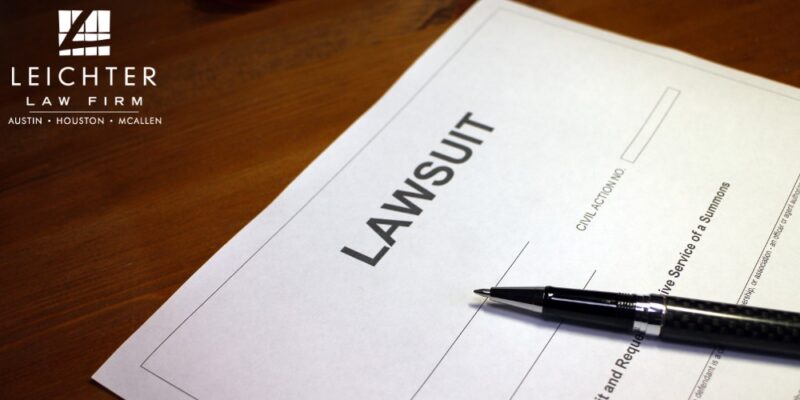Discrimination Lawyer Houston and Austin, Texas

A variety of state and federal laws protect employees from discrimination in the workplace. Many of these laws require an employee to file a claim within 180 days after the violation. If you are the victim of employment discrimination, you should hire an attorney immediately. Instances of illegal discrimination can occur during any part of the employment process, including hiring, firing, promotions, demotions, pay raises, and much more. If you have been the victim of discrimination or a hostile work environment, an Austin and Houston discrimination lawyer at Leichter Law is here for you.
To schedule a free, confidential consultation about your case, please call our office at (512) 495-9995 today.
What Is Workplace Discrimination?
When someone faces treatment that is different or less favorable from others, this is a form of discrimination. Discrimination of any kind can happen anywhere, including at school, in public places, and even at your workplace. Workplace discrimination occurs when your coworkers, managers, supervisors, or others at your workplace treat you differently due to your protected status.
The Equal Employment Opportunity Commission (EEOC) is the government agency responsible for protecting you against workplace discrimination based on race, sex, religion, age, national origin, disability, or other genetic characteristics. If you experience harassment, unfair treatment, inappropriate questioning, denial of reasonable accommodation, or retaliation at your workplace, the EEOC gives you protections against this.
Workplace discrimination is illegal if motivated by an employee’s membership in a protected class. You have the right to file a lawsuit against the responsible party if you are a victim of discrimination at work. Because these cases are very nuanced, we always recommend speaking with experienced Houston employment attorneys before taking major steps. At Leichter Law, our labor and employment law attorneys have considerable experience securing recoveries on behalf of discrimination victims. Don’t hesitate to reach out – you only have a short window to file a claim.
Discrimination at Work Examples
Two main forms of discrimination exist, which encompass the more specific forms of discrimination. These forms are direct liability and vicarious liability. Direct liability involves an employer who is directly involved in discrimination from top to bottom. It permeates throughout the business and promotes a workplace culture of discrimination.
Vicarious liability involves one employee discriminating against another employee, and the employer fails to take steps to correct the behavior. It is possible for both forms of discrimination to occur at the same time. Some more specific examples of workplace discrimination include the following.
- Racial discrimination
- Sexual harassment
- Wrongful termination
- Disability discrimination
- Hostile work environment
- Religious discrimination
- Age discrimination
- National origin discrimination
If an employee is treated differently or less favorably at the workplace in any way because of their protected class status, this constitutes discrimination.
Discrimination Based on Race, Color, Religion, Sex, or National Origin
Title VII of the Civil Rights Act of 1964 (Title VII) prohibits discrimination against someone on the basis of race, color, religion, sex, or national origin. This federal law is integral to many discrimination cases, as it protects employees across the entire United States. Federal laws and state laws may differ in that states can impose stricter penalties or longer filing periods. However, all states still receive the protection of the Civil Rights Act.
Importantly, discrimination can still occur when the victim and the person who inflicted the discrimination are the same race or color. Different forms of discrimination can occur between two members of the same protected class. For example, a minority man can unlawfully discriminate against a minority woman on the basis of her sex.
Additionally, the law forbids discrimination when it comes to all aspects of employment, including hiring, termination, wages, job assignments, promotions, demotions, training, benefits, and any other aspect of employment.
It is also unlawful to harass a person because of their protected class status. Harassment can include, for example, slurs, offensive or derogatory remarks, or the display of offensive symbols. Teasing, offhand comments, and isolated incidents are not prohibited by law. However, harassment becomes illegal when it creates a hostile work environment or when it results in an adverse employment action.
The harasser could be the victim’s supervisor, co-worker, manager, client, or customer. Regardless of who discriminated against you, our Houston employment lawyers are here to give you the support you need to fight for your rights.
What Is Disability Discrimination?
Disability discrimination occurs when an employer treats an employee or applicant with a disability unfavorably because they have a disability.
Disability discrimination also happens when a covered employer or other party treats an applicant or employee less favorably because they have had a disability in the past or because they are believed to have a physical or mental impairment that is not temporary or minor.
The law requires an employer to provide reasonable accommodations to any employee or job applicant with a disability. This is the case unless doing so would cause undue hardship for the employer.
A person can show that they have a disability in one of three ways:
- A person may be disabled if they have a physical or mental condition that significantly limits a major life activity.
- Someone may be disabled if they have a history of a disability (such as a chronic disease).
- A person may also be disabled if they are believed to have a physical or mental impairment that is lasting and not minor.
What Is Age Discrimination?
Age discrimination involves treating an applicant or employee differently because of their age. The Age Discrimination in Employment Act (ADEA) prohibits age discrimination against people who are 40 years of age or older
The law specifically prohibits discrimination when it comes to any aspect of employment. It is also unlawful to harass someone for their age. Harassment can include offensive comments about a person’s age, for example. Harassment becomes illegal when it affects the victim’s ability to do their job, results in a hostile work environment, or leads to an adverse employment action. The harasser can be the victim’s supervisor, a manager, a co-worker, a client, or a customer.
What Is Pregnancy Discrimination?
Pregnancy discrimination involves treating an employee or applicant unfavorably because of pregnancy, childbirth, a condition related to pregnancy or childbirth, or a pregnancy-related disability.
The Pregnancy Discrimination Act (PDA) of 1978 forbids discrimination based on pregnancy when it comes to any aspect of employment. The Act originated as an amendment to the Civil Rights Act of 1964 and encompasses all aspects of pregnancy, including pregnancy-related conditions and disabilities.
If someone temporarily cannot perform their job due to a pregnancy-related medical condition or childbirth, the employer must treat them the same way it would treat other temporarily disabled employees. For example, the employer may have to provide lighter duties, different assignments, leave, or other reasonable accommodations.
Pregnant employees may also have additional rights under the Family and Medical Leave Act (FMLA). Specifically, a pregnant employee may use FMLA leave during their pregnancy or after the birth of their child. Pregnant workers can use up to 12 weeks of FMLA leave for childbirth, prenatal care, and pregnancy-related conditions or disabilities.
Can My Employer Fire Me for Being Pregnant?
No. Under the federal Pregnancy Discrimination Act (PDA), an employer with 15 or more employees may not fire someone for being pregnant. PDA laws also prohibit employers from demoting, refusing to hire, or disciplining an employee because they are pregnant. However, it is important to note that pregnancy does not provide job protection.
An employer cannot fire a worker because they are pregnant, but the employer can legally fire them for nondiscriminatory reasons. If you believe you have been discriminated against in the workplace for any reason related to pregnancy or childbirth, you may want to file a claim with the EEOC. We strongly recommend speaking with an experienced Houston discrimination lawyer about your case.
Texas Discrimination Laws
According to federal and Texas laws, discrimination based on protected characteristics is illegal in the workplace. The specific Texas law that prohibits such discrimination is Chapter 21 of the Texas Labor Code, which is enforced by the Texas Workforce Commission (TWC). This Chapter prohibits discrimination based on race, religion, sex, disability, color, age, or national origin. Currently, there is no Texas law that prohibits discrimination based on gender expression or sexual orientation.
Federal Discrimination Laws
Federal employment law, however, does prohibit discrimination based on gender identity and sexual orientation. It also prohibits discrimination based on other traits, such as pregnancy, citizenship status, or genetic traits. Several federal laws exist that protect employees, including the following.
- Title VII of the Civil Rights Act of 1964
- Americans with Disabilities Act (ADA)
- Age Discrimination in Employment Act (ADEA)
- Immigration and Nationality Act (INA)
- Genetic Information Non-Discrimination Act (GINA)
- Equal Pay Act of 1963
How Do I Report Workplace Discrimination in Texas?
If you believe your employer discriminated against you in your workplace for any reason, you can file a Charge of Discrimination. This charge includes discrimination based on gender, religion, sexual orientation, race, national origin, disability, age, and more. In order to receive protection from the Equal Employment Opportunity Commission laws, you must file the charge within 180 days of the discriminatory incident (or within 300 days under some circumstances). Once the EEOC has been notified of the incident, officials will launch an investigation against your employer.
What Can I Expect When Filing a Discrimination Suit?
If you believe you are being discriminated against in the workplace, you have every right to file an official complaint and begin the claims process. To receive protection from the EEOC, you must file a charge of discrimination with the EEOC within 180 days of the incident (or within 300 days under some circumstances). This charge will notify the EEOC of the person’s discrimination concern and launch an official investigation against the employer.
If no violation is found during the investigation, the petitioner will be granted a Notice of Right to Sue. This notice expresses that the EEOC failed to find any distinct violation, but the petitioner can still file a suit against their employer at their own expense, After the Notice of Right to Sue is given, the EEOC will dismiss the case from its docket.
If a violation is found during the EEOC investigation, it will attempt to reach a settlement with the employer that satisfies all parties. If an amicable settlement cannot be reached, the EEOC will decide whether to pursue a lawsuit against the employer. If the EEOC decides not to pursue litigation, the petitioner will be granted the Notice of Right to Sue and they can choose to continue with the case at their own expense.
In many instances, the EEOC may ask that a petitioner pursue mediation as an alternative dispute resolution before an investigation is launched. The EEOC may decide not to pursue every case that is submitted to it, but that does not mean you don’t have a valid discrimination suit. It is best to consult with an attorney so that you can understand your legal rights. Call the Houston discrimination attorneys at Leichter Law Firm at (512) 495-9995 to schedule a free consultation about your case.
Workplace Discrimination FAQs
What Are Some Signs of Discrimination During the Hiring Process?
A part of the EEOC discrimination laws prohibits employers from basing their hiring decisions on certain information. Consequently, employers are prohibited from even asking questions inquiring about the banned information. If an employer asks you questions relating to your marital status, race, citizenship status, age, religion, or disabilities, know that these questions are not allowed and could be a sign of discrimination. If you believe that you have been discriminated against during an interview or any aspect of the hiring process, contact a discrimination attorney with Leichter Law today.
Will My Employer Retaliate Against Me if I Report Discrimination?
The same laws that protect you from workplace discrimination also protect you from employer retaliation. By law, an employer cannot retaliate in any way against an employee who has reported discrimination, harassment, or filed an unpaid wage claim. Retaliation includes any type of negative employment action, such as termination, demotion, salary reduction, denial of a raise, or maybe even a shift transfer. If you believe your employer is retaliating against you, you may want to report your concerns to the Equal Employment Opportunity Commission and seek counsel from an experienced employment attorney.
Contact a Workplace Discrimination Lawyer with Leichter Law Today
If you have been the victim of any form of employment discrimination, your rights have been violated. The Houston discrimination attorneys at Leichter Law Firm can help you expose the discrimination you’ve faced. We offer free, confidential consultations to those facing discrimination, and we only represent employees. You can rest assured that we will always have your best interests at heart, and we will ensure that your voice is heard. Call (512) 495-9995 to schedule your free consultation today.
Get in Touch
Office Locations
1602 E 7th St
Austin, TX 78702
Phone: (512) 495-9995
Get Directions
3700 N Main St
Houston, TX 77009
Phone: (713) 714-2446
Get Directions
214 N 16th St #128
McAllen, TX 78501
Phone: (956) 205-0884
Get Directions



